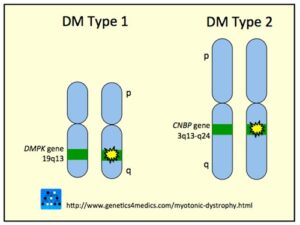Myotonic Dystrophy
What is Myotonic Dystrophy?
Myotonic Dystrophy (DM) is a muscle weakening disorder which is inherited. It is abbreviated to DM because the Latin name for this condition is ‘Dystrophia Myotonica’. In DM, a defective gene causes progressive muscle weakness accompanied by delayed relaxation of muscles after contraction which is called myotonia. It is a multi-systemic disorder, this means that the effects are not limited to the voluntary muscle system, but can also affect tissues and organs throughout the body. Primarily the muscles of the face, neck, hands, forearms and feet are affected, although DM can have a wide range of different effects on different individuals. For more information about Myotonic Dystrophy click here.
The Myotonic Dystrophy Tool Kit
The Myotonic Dystrophy Took Kit is provided by the Myotonic Dystrophy Foundation (MDF) based in the USA. Some of the information is not relevant to MDANZ members but the condition information is very good and well worth a look. There is reference to a Health Passport in this resource and this is available in NZ by contacting us on 0800 800 337 or email info@mda.org.nz.
Updated Myotonic Dystrophy Anaesthesia Guidelines
- These are available here.
Exercise & Nutrition
The Myotonic Dystrophy Foundation (MDF) published an information sheet and Power Point presentation titled Activity and Exercise Recommendations for Individuals with Myotonic Dystrophy following their 2013 conference.

This diagram shows the location of the genetic error which causes Myotonic Dystrophy.
One copy of the gene with an error is enough to cause the condition.
Type 1 is caused by an error in the DMPK gene on chromosome 19 and Type 2 is caused by an error in the CNBP gene on chromsome 3.
Resources
- Consensus-based care recommendations for adults with myotonic dystrophy type 1– Journal article on establishment of Consensus-based care recommendations based on current literature
- Care Considerations for people with MD – These recommendations are intended to help standardize and elevate care for people with myotonic dystrophy and reduce variability in clinical trial and study environments.
- Care Considerations for people with MD(Quick Guide Version)
- MDF Anaesthesia Guidelines – The use of anesthesia raises special risks to DM patients, which include heightened sensitivity to sedatives and analgesics. Serious complications are most common in the post-anesthesia period when risk of aspiration and other complications are increased.
- User Guide: Care Pathway Toolkit for MD – The integrated care pathway tool for the myotonic dystrophy type 1 clientele (DM1-ICP) was developed to be used within the nursing practice for individuals with a late or adult DM1 phenotype. This tool can be used for initial evaluation and regular follow-up at neuromuscular disease clinics and homecare visits. The DM1-ICP is a tool that was designed to support the nursing practice but does not replace nurse autonomy or critical judgment. It was developed to respond to several needs, including: 1) The need to review the services offered to ensure better use of professional resources; 2) The need to integrate evidence-based data within the nursing practice.
- Occupational Therapy – Occupational therapy suggestions for the management of a myotonic patient
- Physical Therapy – Role of physiotherapy in the assessment and management of individuals with myotonic dystrophy
- The Impact of Pregnancy on MD – A registry based study on how women with myotonic dystrophy (DM) are impacted by pregnancy.
- Click here to download a Clinic Visit Planner created by The Myotonic Dystrophy Foundation (MDF) – check list of things to consider when meeting your neurologist or specialist
Useful Websites
The Myotonic Dystrophy Foundation
Webinars available through the Muscular Dystrophy Association USA
www.glasshalffull.online – Former Myotonic Dystrophy Foundation (MDF) Outreach Director and Support Group Trainer Leslie Krongold is taking all the experience she learnt at the MDF and is using it to start her own series of podcasts with the goal of creating support for people with a chronic illness.
Support Group
Myotonic Dystrophy
The NZ Myotonic Dystrophy Support Group is a Facebook group created by MDANZ members to support people with Myotonic Dystrophy.
